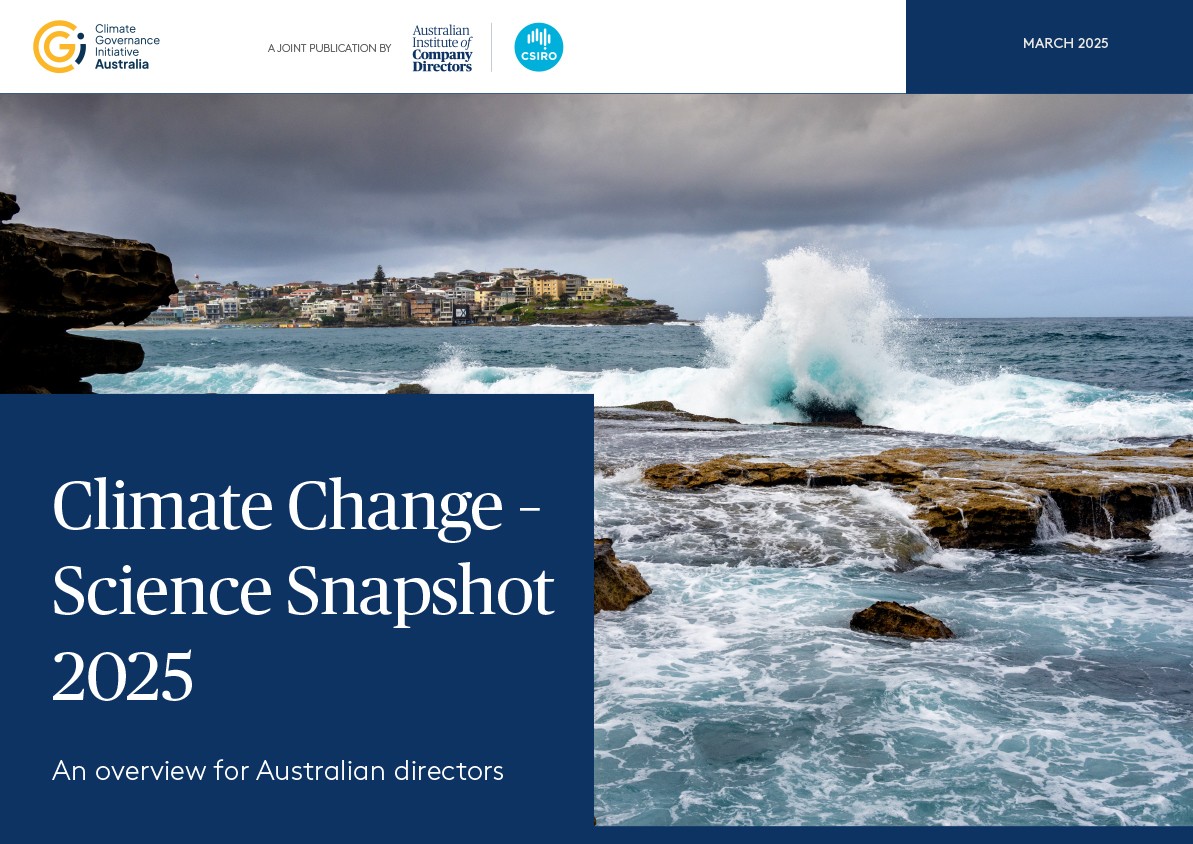The AICD’s Climate Governance Forum returns for its fourth year on Friday, 8 August 2025, at the Melbourne Convention and Exhibition Centre. With close to 2,000 registrations last year, the Forum has become a key event for directors navigating the governance dimensions of climate change. We’re pleased to share the date with you first – ahead of the formal announcement and event registration – so you can find time in your busy calendars.
This year’s Forum program will focus on practical case studies and tangible outcomes from corporate climate action. We encourage you to explore our latest resources below, and look forward to sharing more on the Forum soon.
Also in this newsletter
- Climate sentiment softens in pre-election director index;
- ASIC publishes final sustainability reporting guidance for companies;
- SBTi releases draft Net-Zero Standard V2 for consultation; and
- Market updates: Adelaide to host COP31 if Australia’s bid succeeds; Woodside raises decarbonisation cost concerns; AEMO flags gas supply shortages.
Pre-election director climate sentiment soft, but long-term priority holds.
The latest Director Sentiment Index from the AICD reveals that while climate change is still a key long-term concern for directors, it has slipped down the short-term agenda. Fewer than a fifth (17 per cent) now rank climate as a top immediate issue for government, with economic pressure and regulatory burden most front of mind for directors.
However, directors continue to view climate as a top long-term priority. It ranks second only to productivity growth as the most critical issue for government over the next 10 to 20 years.
Meanwhile, insights from the NFP Governance and Performance Study 2025 show a similar pattern – strong recognition of climate risk (65 per cent of NFP directors believe climate should be prioritised), but limited immediate progress across climate governance, strategy and reporting. Read our analysis
ASIC publishes final sustainability reporting guidance for companies
ASIC has released its final regulatory guide on sustainability reporting, offering greater clarity for companies preparing for mandatory climate disclosures.
The guide sets out how ASIC will interpret the new requirements and underscores the importance of director oversight. It also provides expanded guidance on the use of climate scenarios and reporting of scope 3 emissions. Companies will be required to use at least two climate scenarios: one aligned to 1.5°C and one exceeding 2.5°C.
Boards are expected to oversee reporting systems, critically assess the disclosures made, and ultimately sign off on climate reporting.
While ASIC has reaffirmed a proportionate and pragmatic enforcement approach during the transition, it will conduct annual surveillance and publish findings to support better practice. Read our key takeaways for directors here.
SBTi releases draft Net-Zero Standard V2 for consultation
The Science Based Targets initiative (SBTi) has released a draft of its revised Corporate Net-Zero Standard for public consultation, with feedback open until 1 June 2025. The updated framework seeks to support more credible and science-based decarbonisation plans and follows stakeholder concerns about the appropriate role of environmental attribute certificates (EACs) in emissions reduction strategies. EACs include carbon credits – covering emissions avoidance, reduction and carbon removal – and energy and commodity certificates, such as renewable energy certificates (RECs).
Key proposals for directors to note:
- Scope 2 emissions: Companies must now match renewable energy purchases with operational electricity use in both time and geography, tightening the use of market-based reporting (e.g. renewable energy certificates).
- Scope 3 emissions: The draft introduces greater flexibility, allowing indirect mitigation (e.g. through Sustainable Aviation Fuel certificates) on an interim basis where direct abatement is not feasible.
- Residual emissions: Companies would be required to address scope 1 residual emissions before their net-zero target year, primarily through carbon removals.
The revision follows controversy in 2024, when the SBTi Board signalled a potential expansion of EAC use in scope 3 reporting, triggering debate across the climate and investor community. The new draft reflects feedback from over 230 responses to its earlier consultation.
Directors should confirm that carbon credits and renewable energy certificates are used to supplement – not wholly substitute – emissions reductions. For further insights on the effective use of carbon credits in corporate climate strategies, see a related article by Adam Kirkman GAICD and Ben Stuart.
Featured resources for directors
Climate Change – Science Snapshot 2025: An overview for Australian directors
This new snapshot provides directors with concise and accessible insights on:
- Core climate science concepts and their relevance to governance
- Global emissions outlook and warming scenarios
- Risks facing Australian businesses, communities and ecosystems
- Key questions to support scenario planning and strategic oversight at board level
Opportunities in the Circular Economy: A Primer for Australian Directors
This practical primer introduces directors to circular economy concepts, business models and value chain opportunities, with a focus on the Australian context and forthcoming disclosure obligations.
To complement the resource, a webinar, Circular Economy – Understanding the Opportunity for Boards is planned for June and will feature expert insights and practical examples on how circular principles can support innovation, resilience and long-term value creation. Register now.
Climate Governance for Australian Directors – Short Course
This highly rated program is now fully booked until July 2025. Early registration is encouraged for future sessions. Register today.
Introduction to Climate Governance – Free Online Module
This self-paced, two-hour module is available free to AICD members. It provides foundational climate literacy to help directors understand their governance responsibilities in a changing risk landscape.
Market developments update
- Adelaide to be host city for COP31 if Australia’s bid is successful: The Australian Government is continuing its bid to host the 2026 global climate summit. Australia is competing with Turkiye to host the COP31 talks, with a decision expected after the federal election. The Coalition has stated it would not pursue the bid if elected, but would remain committed to the Paris Agreement.
- Woodside CEO raises decarbonisation cost concerns: The AFR reports Meg O’Neill raised cost concerns with options such as retrofitting carbon capture on existing LNG plants estimated to cost between US$200–$500 per tonne – above the company’s current emissions reduction cost base of US$80 per tonne. The comments come ahead of the company’s May AGM, where its climate strategy will again be in focus. Advocacy group, the Australasian Centre for Corporate Responsibility, is urging investors to vote against the re-election of three directors, arguing that there have been poor shareholder returns and a failure to adequately manage climate risks.
- Federal Court orders Clorox to pay $8.25m for misleading ‘ocean plastic’ claims, following court action by the ACCC. Clorox Australia Pty Ltd admitted that between June 2021 – June 2023 it breached Australian Consumer Law by representing GLAD products were made of at least 50 per cent recycled plastic waste from the ocean, when this was not the case.
- BP is facing shareholder pushback following its shift away from renewable investments. Major investor Legal & General is opposing the re-election of the outgoing chair, reflecting broader divisions among shareholders on climate strategy and returns. Divergent investor views highlight the challenge for BP and other major oil companies in balancing whether to maintain a focus on fossil fuels amid global climate pressures, or pivot to renewables.
- Deutsche Bank’s asset management arm, DWS Group, has been fined €25 million by German prosecutors over misleading ESG product claims. The fine follows a US$25 million settlement with the US SEC in 2023 for similar issues, including anti-money laundering deficiencies.
- Australians concerned about biodiversity loss: The third annual Biodiversity Concerns Survey reveals 96 per cent of Australians believe more action is needed to protect the natural environment. Over half say ‘a lot more’ or ‘a great deal more’ is necessary. The survey, conducted in late 2024 by the Biodiversity Council, included responses from 3,559 Australians.
- Australia’s 2025 State of Net Zero Investment report by the IGCC finds growing investor momentum on climate, despite global ESG pushback. The report shows progress across five of six key indicators, with only climate action plans dipping – likely due to emerging regulatory standards. Findings are based on data from 65 superannuation and investment organisations managing A$4.2 trillion in assets.
- A 2025 carbon market report released by the Carbon Market Institute highlights the growth of Australia’s carbon markets. It records a 31 per cent increase in ACCU trading value and significant progress in Indigenous carbon projects. The report calls for a national carbon market strategy to maintain investment momentum.
- Australia’s renewable energy can power AI and cut costs: According to a new paper by Australian researchers, Australia’s renewable energy resources offer a strategic opportunity to support the growth of AI while lowering energy costs – positioning the country as a leader in the sustainable digital economy.
- AEMO flags future gas shortfalls: The 2025 Gas Statement of Opportunities report finds southern Australia faces gas shortfall risks from 2028, with structural supply gaps expected from 2029. New supply, storage and pipeline investments are critical to maintain energy reliability and support firming of renewables.
- New resource: Climate and Nature in the Boardroom. The Climate Governance Initiative has released a new resource to support directors in bringing climate and nature considerations into boardroom decision-making.
We would welcome feedback on this newsletter. To share your thoughts, please contact Kulja Coulston via email at policy@aicd.com.au.
Already a member?
Login to view this content





